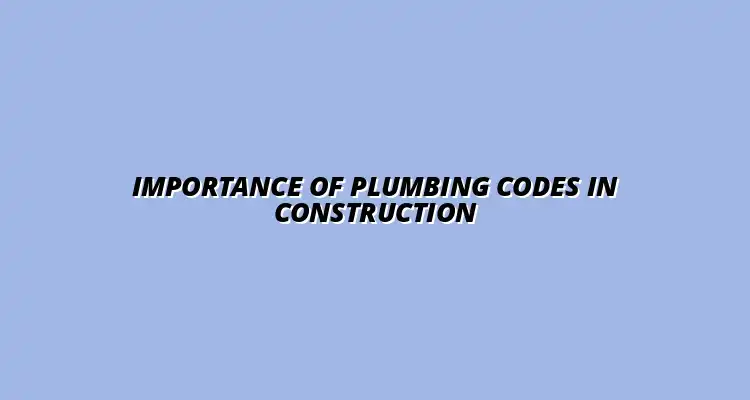
- Beginner Tips
- Jan 10
2025-01-31
The importance of plumbing codes in home construction cannot be overstated. These codes set the standards for how plumbing systems should be designed and installed. They ensure that homes are safe, efficient, and compliant with local regulations, which can ultimately affect homeowners down the line.
By following plumbing codes, builders and contractors help create a reliable infrastructure that protects not only the homeowners but also the community at large. Understanding these regulations is crucial for anyone involved in the construction or renovation of a home. For a better understanding of residential plumbing systems, check out this helpful guide: Understanding Residential Plumbing Systems.
Plumbing codes are sets of guidelines that govern the installation and maintenance of plumbing systems. Their primary purpose is to ensure safety, health, and environmental protection. They cover everything from pipe materials to proper installation techniques, making it essential for builders to comply with these regulations.
In essence, plumbing codes serve as a blueprint for what is deemed acceptable in plumbing practices. They reflect industry standards that evolve over time, ensuring that homes remain safe and functional for residents.
Plumbing codes play a vital role in maintaining public safety by preventing potential hazards. This includes reducing the risk of water contamination and protecting against plumbing failures that can cause severe damage. Adhering to these codes is crucial in fostering a safe living environment for families and communities alike.
Moreover, plumbing codes help in managing issues related to sanitation and hygiene. By following these guidelines, builders can prevent issues such as sewage backups, which can pose health risks to residents. Learning how to fix a running toilet can be a great first step in maintaining your plumbing system: Fixing a Running Toilet Easily.
By adhering to plumbing codes, builders can significantly reduce the risk of water damage and structural failures. Properly designed plumbing systems ensure that water is effectively managed, minimizing potential leaks and bursts. This is crucial in protecting the integrity of a home’s structure.
Additionally, code compliance helps identify potential vulnerabilities in plumbing systems early on. This proactive approach can save homeowners substantial costs associated with repairs and maintenance in the long run. Regular maintenance is key, and this guide provides essential water heater maintenance tips: Essential Water Heater Maintenance Tips.
Proper drainage is a key aspect of plumbing codes that cannot be overlooked. Codes dictate how waste should be handled and drained, preventing blockages and backups. Without these regulations, homeowners might face serious health hazards and costly repairs. Knowing how to identify common plumbing problems can be very helpful: Identifying Common Plumbing Problems.
Plumbing codes are intricately connected to building codes, forming a comprehensive regulatory framework for construction projects. While plumbing codes focus on the plumbing systems themselves, building codes cover broader aspects of construction, including structural integrity and safety. Together, they ensure that homes are built to withstand the test of time.
This interconnectedness emphasizes the importance of a holistic approach to construction. Builders must understand how plumbing codes complement building codes to achieve a well-constructed, safe home. For example, understanding how to fix kitchen sink leaks can prevent larger issues: Fixing Kitchen Sink Leaks: A DIY Guide.
Compliance with plumbing and building codes is not just a legal requirement; it’s a commitment to quality and safety. Local and national regulations can vary, making it essential for builders to stay informed about the specific codes that apply to their projects. Failure to comply can lead to penalties and safety issues.
Many homeowners have misconceptions about plumbing codes, often viewing them as unnecessary hurdles. Some believe that codes only serve to complicate construction projects, but in reality, they exist to protect homeowners and enhance the overall quality of construction. Understanding these myths can foster a better appreciation for plumbing codes.
For instance, a common myth is that code compliance is only important during the initial construction phase. In truth, ongoing maintenance and updates to plumbing systems should also adhere to current codes to ensure safety and functionality. Regular bathroom plumbing maintenance is also essential: Bathroom Plumbing Maintenance Essentials.
Compliance with plumbing codes is essential for homeowners who wish to maintain their property’s value and safety. Ignoring these codes can lead to significant issues, including costly repairs and potential legal problems. By understanding the importance of compliance, homeowners can make informed decisions regarding their plumbing systems.
Homes built in accordance with plumbing codes generally see a positive impact on their appraised value. Appraisers look for evidence of code compliance during inspections, making it a critical factor in determining a home’s worth. Therefore, adhering to plumbing codes can enhance a property's marketability.
Compliance not only adds value but also provides peace of mind to potential buyers. Knowing that a home meets all safety standards can make a significant difference in their purchasing decision.
The market perception of homes built with adherence to plumbing codes is overwhelmingly positive. Buyers are more likely to trust homes that have been constructed following established regulations, as it indicates a commitment to quality and safety. This trust can lead to quicker sales and potentially higher offers. Finding a reliable plumber is crucial for any plumbing project: Plumber in Billesley, Birmingham.
Compliance with plumbing codes can be a daunting task for both homeowners and builders. Understanding the local regulations is essential for ensuring that your construction projects meet the necessary standards. In this section, we will dive into the key considerations you should keep in mind to navigate these challenges effectively.
By familiarizing yourself with the plumbing codes specific to your area, you can avoid potential pitfalls during construction. Working closely with qualified professionals will also help you tackle these challenges head-on. Here, I’ll break down the most critical aspects you need to consider.
One of the first steps in ensuring compliance is to understand that plumbing codes can vary significantly by location. Local governments may have unique requirements based on environmental conditions, current infrastructure, or even historical factors. Therefore, it’s critical to do your homework!
Another important aspect is collaborating with licensed professionals who are familiar with local codes. This partnership not only saves time but also ensures that your project adheres to all necessary regulations. Here are some key considerations to keep in mind:
Local variations in plumbing codes exist due to differences in climate, geography, and community needs. For instance, areas prone to flooding may enforce stricter regulations on drainage and water management. It’s crucial to be aware of these variations to ensure your project meets all local standards.
Additionally, some regions may have their own amendments to the National Plumbing Code, which can further complicate compliance. Understanding these factors will make it easier to navigate the permitting process. Here are common variations you might encounter:
When it comes to ensuring plumbing code compliance, working with licensed professionals is invaluable. They are equipped with the knowledge and experience needed to navigate the complex world of plumbing regulations. Hiring experts can help you avoid costly mistakes and delays.
Furthermore, licensed professionals often have established relationships with local authorities, which can smooth out the permitting and inspection process. Here’s why you should prioritize working with licensed professionals:
It's common to have questions about plumbing codes, especially if you're new to home construction or renovation. Understanding the implications of ignoring these codes is crucial to protecting your investment and ensuring your home’s safety. Below, I’ll address some frequently asked questions regarding plumbing regulations.
Staying informed about changes in plumbing codes is also vital for homeowners and builders alike. Regulations can evolve over time, impacting how projects should be approached. Let’s explore some common inquiries.
Ignoring plumbing codes can lead to severe consequences, both financially and structurally. Homeowners might think they can save money by bypassing these regulations, but the risks far outweigh any short-term savings. Here are some potential consequences:
Staying informed about plumbing regulations is essential for compliance. Local building departments often publish updates, so checking their websites regularly is a great start. Here are a few tips to keep yourself updated:
As we move into the future, plumbing codes are evolving to accommodate new technologies and environmental considerations. Emerging trends are shaping how we think about plumbing in construction projects. It’s exciting to see how innovation is making its way into our homes!
With advancements in technology, we can expect more comprehensive and stringent plumbing regulations that not only focus on compliance but also on sustainability. Here’s what to look out for:
Plumbing regulations are increasingly integrating eco-friendly practices. This shift not only promotes sustainability but also helps homeowners save on utility bills. Some emerging trends in plumbing codes include:
Technology is transforming how we approach plumbing codes and compliance. New tools and software can help builders and homeowners monitor their plumbing systems more effectively. These advancements can lead to safer and more efficient plumbing practices.
Some technologies that are influencing plumbing standards include:
Ensuring compliance with plumbing codes doesn’t have to be an overwhelming process. By following some practical steps, both homeowners and builders can navigate this landscape more confidently. Let’s get into the nuts and bolts of what you can do!
Taking proactive measures during the planning and construction phases can prevent headaches later on. Here are a few essential tips to guide you:
When planning any construction project that involves plumbing, it’s essential to be organized and informed. By preparing adequately, you can ensure compliance with local codes and regulations. Here are some tips to consider:
Access to reliable resources can make understanding plumbing codes much easier. Various online platforms and local government agencies provide valuable information. Here’s where you can find useful resources:
In conclusion, plumbing codes are vital for ensuring the safety and functionality of our homes. Understanding these codes helps homeowners and builders navigate construction projects successfully. Engaging proactively with these regulations can lead to a more efficient process.
As we’ve discussed, the importance of plumbing codes cannot be overstated. They protect not only your investment but also the well-being of those who inhabit your space. Here are some key takeaways:
To summarize the significance of plumbing codes, here are some essential points to remember:
Finally, it’s crucial to encourage proactive engagement with plumbing standards. The more informed you are, the better prepared you’ll be for successful construction projects. I urge all homeowners and builders to take these lessons to heart!
By prioritizing compliance with plumbing codes, you’re not just protecting your investment but also enhancing the overall safety and quality of your home. Let’s build better together!
